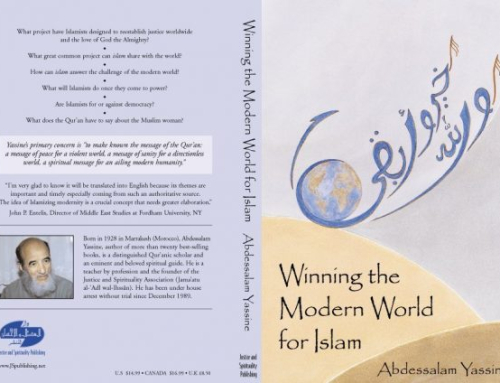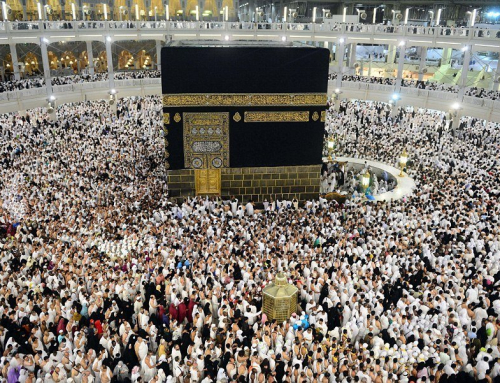Yassine Hicham
March 26, 2018
Imam Yassine’s thought is, therefore, a fabric unique in conception because it projects Islam in its true colors and caters for all the Muslim sects by obliterating the unhealthy intrusions of bias and prejudice.
The execution of the thought also harmonizes with its conception. The thought, through an enviable synthesis of justice and spirituality, is therefore easily transformed into a three-dimensional exposition of the basic rungs of Islam: islam, iman, and ihsan. And the prerequisite fundamentality of Imam Yassine’s thought is to unify divided sensibilities, not to fracturize them further, its foremost aim is to assemble the divergent sects on a common platform, not to split them from one another, its coveted objective is to downplay the factional cleavage, not to overplay the adventitious rifts that have splintered the Muslims into groups and ‘group-uscules’. Imam Yassine rightly believes that Muslims all over the world, whether they live in the deserts of Arabia or the fertile plains of the Indo-Pak subcontinent, whether they are dark in complexion or fair-skinned citizens, whether they wallow in affluence or are pinched and squeezed by the tweezers of penury and poverty, are essentially charged and electrified with the galvanizing spirit of Islam, though it lies buried under the crust of insensitivity and the layers of indifference which have gathered around it through centuries of inactivity and inertia. It only needs to be revived and recharged as it has potentially always existed as a substratum in the Muslim consciousness. This is bound to recharge the weakened battery of the collective automobile of the Muslim thought and transmute them into a truly reawakened community, the really chosen people of God on earth. Imam Yassine’s judicious selection of materials for his numerous books is designed to discourage divisive tendencies among the Muslims and miraculously forge them into a unity through a massive and creative concentration of their fragmented sources. Therefore the achievement of his books is really unique as it is the scholarly response of a true and devoted Muslim to the heartbeats of millions of disunited Muslims who crave for unity but lack the means to achieve it.
His encyclopedic thought is also philosophical in its presentation, its central concepts are logically and systematically developed. The main reliance is on reason, not on emotion; emotion only accentuates reason and is not imposed on it as an irrelevance or excrescence; it only heightens the clarity of its contents and guards it from lapsing into a flabby and lifeless dissection. And on top of all, it is a philosophy of human life as it is lived; it is not a philosophy of human speculation but of human action; it is not a philosophy of contemplation but of demonstration; it is not a philosophy of meditation but of performance. The speculative element plays second fiddle to the demonstrative element, as Islam is a reinforcement of reality, not a divorce from it; it is an affirmation of the practical side of life, not a rejection of it; and it is a confirmation of the validity of living, not a denial of it. Therefore, the basic orientation of the thought is thoroughly practical and there is not the slightest deviation from its fundamental pragmatism that is focused on the actual accomplishment of an Islamic uprising at the international level and not in weaving endless webs of purely intellectual gossamer around it. This meticulous pruning of the perfunctory and the accidental makes it a truly practical guide to mold individual and collective lives on Islamic lines.
In the present climate of half-chewed opinions and half-baked systems of thought, any philosophy that claims to offer bread and butter with an extra dish of marmalade, becomes the heart-throb of millions of people who are groaning under the jack-boot of poverty and starvation. This applies equally to Muslims and non-Muslims. The fact is that a larger number of Muslims only gabble about Islam. They do not practice it. The primary reason is that they have lost genuine faith in Islam; and the secondary reason is that they do not have a practical Islamic model before them which can adequately meet the challenge posed by a chaotic plurality of atheistic ideologies. Imam Yassine’s thought fulfills the Muslim need by offering a viable model of operative Islamic values in complete consonance with the exigencies of the contemporary situation. For example, the most cherished darling of the starving millions is socialism, but Imam Yassine demonstrates, with all the logic and eloquence at his disposal, that socialism is no match for Islam when the latter is implemented and practiced in both letter and spirit. He places special emphasis on the Qur’anic concept of Ihsan which blends spiritual growth with benevolence; it is in fact visible, active assistance rendered to needy human beings. Thus it is a unique Qur’anic blend to extend practical help to the suffering ailing mankind. The concept of Ihsan is rooted in human obligations, not in human rights. Other philosophies place maximum premium on the rights of man, but Qur’an believes that if each man is aware of his obligations towards other human beings, he will have his rights automatically realized. Thus Qur’an strips human beings of the chronic feeling of insecurity which is the most pervasive malady of the capitalist and the communist blocks. Even otherwise, socialism has come to the end of its yodel; like all man-made systems it has exhausted itself; it is now a clucky hen, unable to lay golden eggs any more, while the chicks it has already hatched are spluttering with countless frustrations. Imam Yassine’s thought will benefit not only the Muslims but also the non-Muslims as it offers the only divinely guaranteed solution of the various ailments of contemporary mankind.
















